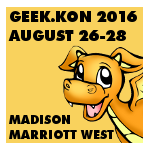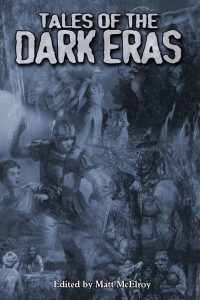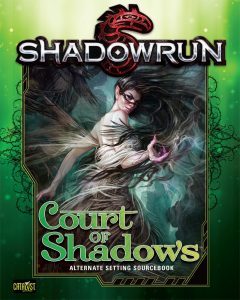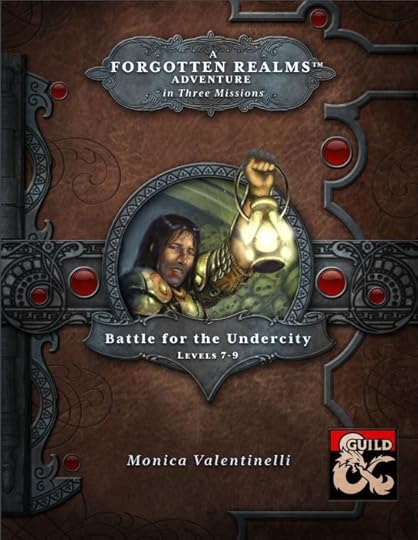Monica Valentinelli's Blog: booksofm.com, page 32
August 29, 2016
Geek*Kon and Processing Your Emotions Like a Pro Panel Recap

Sitting in my office inhaling Pocky and relying a little too heavily on the Diet Mountain Dew this fine day, if only because this year’s Geek*Kon was a whirlwind of color and panels and friends. I continue to be in awe of the love, energy, and effort of anime fans and the work they put into their costumes, and use this weekend as a reminder that the future of reading is incredibly diverse. Plus, I want to give a shout out to the Lolita girls who put a lot of time and energy into their fashionable dresses to walk around the show. Also: Enrica Jang (Red Stylo Media) and Jennifer M. Smith are both awesome women in comics. Be sure to check out their work!
This weekend I was on several panels and presentations and noticed a lot of up-and-coming or inexperienced writers in the audience. Most of my advice about writing translates to this: I cannot give you any advice that will help you fix a manuscript I haven’t read, have the confidence to keep writing all the way through to The End, the best way to learn how to write and to keep internalizing processes is to Do The WorkTM, and lastly…if you’re having trouble balancing worldbuilding and story remember why you’re creating settings. If you’re writing a novel, then your story trumps the world you’ve built separately every time. Sometimes, there’s wonderful aspects of a world that make sense technically but might not translate well into fiction–and that’s totally okay! In the end, there’s no magical bit of advice I can give anyone other than to Do The WorkTM and be loyal to it. You’d be surprised how smart other people really and truly are; if you don’t Do The WorkTM others will figure that out, too.
Emotions and Professionalism
I also proposed a new panel this year about the connection between emotions and being a professional. Briana Lawrence joined me to talk about her experiences and offer nuggets of wisdom. I Tweeted a bunch during the panel, but I wanted to share with you some thoughts that came out of the panel because I feel they might be helpful for you.
Briana told the crowd that, “The first problem is that creatives are not taken seriously as having a real job. Cons are work.”
This, here, is where a lot of problems come into play because there’s an emotional journey artists take especially if they do not have a supportive environment either through close friends or immediate family. What artists do, regardless of which type of art we make, is not treated as work. When our efforts are not thought of that way, the work is then devalued and our time is taken for granted. Plus, many artists never get past this step to realize that a) yes, they are an artist and b) you can build a career even though that bit is hard, complicated, and draining at times due to the struggles we have with the financial component.
I mentioned, for example, that when I make friends or go to Bar Con I do not want to talk about work or think/worry about social commerce and “who” I’m talking to. I think about work enough as it is, and “picking my brain” is something that I will do on my terms. When I’m in my off-time, I value the ability to just hang out and be. I do not make friends based on whether or not they can help me or do things for me on a free basis, and that’s partly how I’ve gotten to know a lot of people. But, as I’ve said many times before, knowing people is not a replacement for Doing The WorkTM, either. While there are systemic issues that exist, especially when it comes to marketing/visibility, that’s all I have control over. Often, it’s never just “the one” person asking for advice, either. This is partly why I go to conventions in the first place; cons are a way of giving back, and many of them are on my own dime. Worse, however, is challenging the perception that artists are stuck up, arrogant, or bitchy for not “giving back” on someone else’s terms when what we do is not considered work. That’s partly why I said that: “When you are an artist, you don’t get paid for finding inspiration. But that matters, so have a life.” We don’t get paid for research or inspiration or downtime, but that’s part of the cycle of creativity, too.
Briana reinforced this by saying: “I used to call myself the Dream Crusher. No one wants to hear that there’s no easy path to the spotlight. You need to Do The WorkTM.”
We did spend some time talking about conventions, and we shared some tips for handling (most) situations. They are:
1.) Know someone at con to be there if there’s a problem. e.g. Safety net. This also extends to knowing where/when to report a problem if it occurs ahead of time.
2.) Pick an outfit/style you just wear at cons as a visual cue/mental reminder that you are working and presenting.
3.) Give yourself permission to feel. It’s okay if you have to back outing a conversation/panel if it’s too much for you. This is especially important if you get bad news!
4.) Plan downtime to rest/recharge and give yourself some personal time. (I use Google Calendar to plot out my free time.)
5.) Buy something small for yourself as a reward to build new and positive memories from another author, artist, or while in the dealer room.
Then, the conversation flipped to dealing with online harassment and interactions. I mentioned that I manage the small things emotionally on a daily basis, because if I go broad I will get depressed from all the things I can’t change. I also advise to establish boundaries both online and off, to ensure your emotional health is maintained. It’s okay to say “No.” However, there were several nuggets of wisdom and observation from Briana due to her experiences online that I want to capture here:
There’s a perception that if you don’t comment you don’t care, or that awful behavior that doesn’t get outrage is okay. (e.g. blackface)
You do not need to tag people to be “the black voice” and fight your battles for you.
Remember that folks get tired of having the same conversations over and over again. Blackface was not okay in 2013, and it’s not okay now.
Consistent comments hurt. You do not need to engage to prove you can handle trolls or how strong you are.
So there you have it! Brand new panel, and I think that went pretty well. Thanks to Briana and her words of wisdom; she definitely added a lot to a touchy and sensitive topic.
Mood: E-mail is teh ugh.
Caffeinated Beverages Consumed: Wheeeeeeee!
Work-Out Minutes Logged Yesterday: Booth tear down.
In My Ears: Computer fan.
Game Last Played: Star Realms
Book Last Read: *glances at pile* Oy.
Movie/TV Show Last Viewed: Snow White and the Huntsman: Winter’s War
Latest Artistic Project: A bunch of earrings.
Latest Fiction/Comic Release: Gods, Memes, and Monsters , Tales of the Dark Eras , and Firefly: The Gorramn Shiniest Language Guide and Dictionary in the ‘Verse .
Latest Game Release: Ghouls & Revenants for Vampire: The Masquerade and Court of Shadows for Shadowrun.
Current State of Projects: Read my latest project update.




August 25, 2016
My Geek*Kon Schedule
I’m headed to Geek*Kon tomorrow, and am on quite a few panels. This year’s line up includes a stellar list of guests for 2016, which you can find here along with their bios. I’m pretty sure this is my last convention for the year, and I’m excited to see some friends before I get a touch anti-social to write and focus more on my blog here. Hope to see you at the show!
Friday, August 26
6:00pm – 7:00pm Shattering Female Stereotypes in Comics (Geneva Room)
Saturday, August 27
10:00am – 11:00am Are Agents Still Necessary? (Salon F)
5:00pm – 6:00pm Worldbuilding: Types and Techniques (Salon G)
Sunday, August 28
12:00pm – 1:00pm Processing Your Emotions Like a Pro (Mendota Room)
2:00pm – 3:00pm The Feedback Loop (Salon F & G)




August 22, 2016
A Bleary-Eyed (And Slightly Furious) Post World Con Recap

For me, the “p” in publishing is about people–the good, the bad, the garbage fires–and sometimes I need to center myself and remind myself of that, because while there is no replacement for simply sitting down and doing The WorkTM, I find that pursuing a career in writing is also about learning how to build, maintain, and strengthen relationships.
This year, I went to World Con(1) with my Red Sofa Literary agent, Jennie Goloboy, who treated me like gold, my friend and fellow agent Laura Zats, and many of the authors from our agency including the illustrious Tex Thompson and Foz Meadows. This fine network of people was supported by my relationships with Apex Book Company and magazine, the publisher of the upcoming anthology Upside Down: Inverted Tropes in Storytelling, and many other fine and storied individuals including Catherine Lundoff, Carrie Patel, Gareth Michael-Skarka and his amazeballs wife Laura, Gary Kloster, Michi Trota, Maurice Broaddus, Lynne and Michael Damian Thomas, Lee Harris, David McDonald, Michael Underwood, Fonda Lee, Esther MacCallum-Stewart, Martha Wells, Sunil Patel, Rachel Swirsky, Nick Mamatas(2), Ferrett Steinmetz, Karen Bovenmeyer, Brian Nisbet, and so, so, so many others whom I hope will forgive me if I have forgotten to mention you(3).
Part of the issue, however, with managing relationships is dealing with the fallout when they are strained or broken. Hurting people is what the Sad Puppies and Rapid Puppies and -gates and garbage fires do, especially online because they are attempting to push forth their perception of the universe as “The Only Solution” and make everyone else suffer for it. They actively hurt authors and artists and game designers and dealers and editors and anyone who is simply trying to make art and do the best they can, because now making a game or writing a story can include the fear of being doxed or the anxiety that comes from receiving multiple death threats for writing a story or creating a character which is, quite possible, “the” most ridiculous thing I have ever heard. World Con reinforced the notion that the loud, vocal minority who are threatened that their world is changing and they don’t like it are, in point of fact, a teeny tiny selection of individuals who do not, in any way shape or form, stop authors, artists, and game designers from continuing to make great art representative of the world that already exists.
As I said in my game development presentation, everyone deserves to see themselves as the hero, to play as the hero, to be the hero. And this, my friends and dear readers, is why the Hugos were so significant this year. It’s not just because love won, it’s because the garbage fires do not stop us from making the art we want to make, nor does it stop those who are making great art be recognized for their efforts. Is it harder? Yes. More complicated? Yes, especially when you toss in the fact that many publishers expect us to be online. But, as I’ve said multiple times before, ninety-five percent of the people I work with are not assholes–and this is true of everyone else, too. That doesn’t mean that personality conflicts don’t exist, because they do, but that’s not the same as someone specifically and intentionally harming total strangers because they don’t share the same views. That also does not mean that problematic five-to-ten percent does not, and should not, be dealt with. What this does translate to on a broader level, however, is that so many of us are doing the best we can to be welcoming, to be supportive of new and existing writers, to show support whenever possible and to build the future our readers and players would be honored to participate in.
Many of these “big picture” efforts can be challenging for the simple fact that different people go to different cons for different reasons and, at a show like World Con, there’s a heavy emphasis on readership and meetings for so many people. This is where I think Programming can fit within that niche, because panels can be representative of topics that people want to listen to and think about. They were for me (with the exception of one which I’ll get to here in a bit). I felt very comfortable being on programming this year, in part because I knew the folks behind-the-scenes and their efforts to keep on top of managing it. It is not easy to run a convention, especially on a volunteer basis, when there are 1,000 logistical nightmares that can and do happen. I had a great selection of panels, and I felt that readers and professionals of all stripes could have benefited from the advice of my fellow panelists. I did run Build-a-World with a smaller audience, due to being up against the Masquerade, Tor party, etc. but everyone had fun and we raised $200 for charities selected by Michi Trota and Rachel Swirsky–$100 of which was donated by World Con itself.
Of the programming I was on, I want to focus on a highlight before I get to the one issue I had. My game development panel was packed, and I was able to drop a lot of knowledge following on the heels of being an Origins University presenter, Gen Con Industry Insider, etc. Presenting on this topic, by myself, was easier because this is an area that I know very well, and I got the feedback from the audience that some standalone panels are necessary just because of the expertise of the speakers involved.(4) More than that, however, this is the first time I’ve been in a non-gaming convention environment, speaking about games. The reception was warm and positive, and I was able to get instant feedback, too, on how I approached the diversity and inclusion aspects–which was great for me(5). Here’s something I said which I feel might be useful for those of you working on games going forward. I said that if you are working on a game and you are queer, for example, and the developing aspects of a game make you feel uncomfortable, you should absolutely speak up and talk to your developer. Our job is to balance varying perspectives and make the best game possible, and we can’t always do that if we do not get feedback from the people we are working with.
I did, however, have one problematic panel which I do need to follow up on with World Con itself. They are aware I had an issue, too, and multiple individuals recommended I give them feedback. If you had a problem at the show, please consider reporting it. Anyway, first I’d like to give you a little context. I was concerned about my Firefly panel, because I have had awful experiences before where I have not had to speak about the work myself and others have done to expand the ‘Verse, and the panel devolves into why fans love Firefly. To address that, I did three things: a) I raised the issue with World Con programming back in January talking about my concerns, and that if this could be addressed I would be happy to be on the panel b) I asked other friends and professionals for advice on how to deal with this situation, which included learning where I was falling down on the subject and the possibility of withdrawing from the panel and c) I exchanged e-mails with our moderator and fellow panelists ahead of the show. As far as I was concerned, I had done my due diligence and assumed that the panel’s topic “The Golden Age of Firefly” which specifically began to address the ancillary projects including the comics, games, etc. would help rein in the discussion and focus on the expansion of the ‘Verse.
Unfortunately, it did not and as all of this information is public knowledge, I have no problem talking about what happened. The academic on our panel, Dr. John Tibbets, became increasingly fixated on his points about how Firefly was so great and nothing else can compare. His behavior included laughing when the Mandarin Chinese was brought up, and while I was lauding the efforts of a great writer and human being Jenny Lynn, the show’s translator, he continued to laugh into his microphone while I was speaking. Jenny did an amazing job providing and presenting the translations, but she also offered a very candid interview where she discussed her role on the show and dived into the Mandarin Chinese spoken and presented in the episodes as well. Let me be blunt: it is not acceptable in any way shape or form to laugh at a fellow panelist or dismiss the work they are recommending, and I am honored that I got to include Jenny Lynn’s work in the Gorramn Shiniest Dictionary & Phrasebook in the ‘Verse. The panel continued to devolve from there, into a conversation about how modern day superheroes aren’t like they used to be, and ended with Tibbets saying: “No offense, but Firefly was perfect as a standalone season and nothing else should have been made.”
Here’s why I walked away from that panel angry, upset, and pissed beyond belief: I have worked on this property since 2012 with dozens of individuals, both new and experienced, balancing the needs, desires, and goals of the projects for Margaret Weis Productions, FOX TV studios, and Titan Books while carefully respecting, analyzing, and building upon Whedon’s work. I would not be working on Whedon’s Firefly and expanding the ‘Verse if I did not enjoy doing so, but this has not been my fandom in the sense that I admire or think about Firefly from afar, this has been my job. Firefly is not just about personal feelings for me, though I have many of them, it has been a significant portion of my career for the better part of the last four years–and Tibbets did not only disregard that, having been told this in an e-mail beforehand, he completely and wholly disrespected everyone I have ever worked with. This. Will. Not. Stand. Say what you want about me, and I can make a decision whether or not to respond, but do not–ever–attack, dismiss, or laugh at anyone else I’ve worked with in front of an audience. Awful, awful behavior and, as a result, watch for an upcoming post where I laud Jenny’s efforts and discuss how she made me a better human being.
To make matters worse? This panel, my dear readers, was also being recorded and I knew it, too. Imagine what would’ve happened if that panel would’ve turned hostile, especially since I wasn’t the moderator, or if I would have told Tibbets what I was actually thinking. Instead, I tried to do the best I could under the circumstances and attempted to directly include author Tex Thompson who wrote a series of her own because she was inspired by Firefly. Pro tip? Do not–under any circumstance–piss on fans, viewers, readers, etc. who do not share your personal loves and joys in front of me, especially on a panel. There is a difference between attacking someone’s emotions and thinking of a work critically, and this was not the latter. To put a pin in this: I expected a lot more from an academic. I hope those listeners out there who wanted that discussion got a few useful bits from the little I could offer given the circumstances.
To sum up the show: it was great to reconnect with everyone(6), programming (with the exception of that panel) was good for me, I was impressed with how the show was managed and handled, thrilled by the outcome of the Hugos and the many great speeches, and feel secure I have made the right decisions to build my career. I love you all! Now, please go write your assess off and tell us a kick ass story or design a great game. To me, that is the highest compliment you can give me. Go make some f-bombing art.
(1) I deeply apologize for not giving you a recap of Gen Con. As an Industry Insider, I had a different focus this year and had multiple meetings on top of networking and hanging out with friends. So sorry!
(2) Haikasoru is the publisher he works for. Check ’em out! They rock!
(3) Con crud. Oy.
(4) I had the pleasure of moderating a panel with Kij Johnson, for example. Highly, highly recommend her.
(5) I consider myself the perpetual student, because the day I “know everything” is the day my work stagnates and suffers.
(6) Karaoke was the highlight of my con, and I wish all Clarion West graduates and instructors the best in their oh-so-bright futures.
Mood: Ready to take a nap.
Caffeinated Beverages Consumed: Experiencing withdrawal. Joy of joys!
Work-Out Minutes Logged Yesterday: Suitcase lifting
In My Ears: Blissful silence
Game Last Played: Star Realms
Book Last Read: Anything before Gen Con (e.g. August) is pretty hazy at the moment.
Movie/TV Show Last Viewed: The Martian
Latest Artistic Project: A bunch of earrings.
Latest Fiction/Comic Release: Gods, Memes, and Monsters , Tales of the Dark Eras , and Firefly: The Gorramn Shiniest Language Guide and Dictionary in the ‘Verse .
Latest Game Release: Ghouls & Revenants for Vampire: The Masquerade and Court of Shadows for Shadowrun.
Current State of Projects: Read my latest (woefully outdated) project update.




August 11, 2016
My World Con 2016 Schedule
Here are the panels and events I’ll be participating in at the show.
Launch Pad
Thursday, August 18 15:00 – 16:00, 2210 (Kansas City Convention Center)
Launch Pad is an annual event whereby a group of invited writers, editors, and creatives learn about modern science, specifically astronomy, so that they can in turn use it in their work and inspire others. Members who have attended Launch Pad discuss how it has affected their writing and ideas.
Changing the Medium
Friday, August 19 14:00 – 15:00, 2206 (Kansas City Convention Center)
A look at what is involved when adapting a property from its original medium to another. How does a movie become a game or a book turn into a television show? What artistic licenses must be taken and how do you remain true to the spirit of the original?
The Golden Age of Firefly
Friday, August 19 18:00 – 19:00, 2206 (Kansas City Convention Center)
Although there hasn’t been a new episode in 13 years or a movie in 11, Firefly fandom is going strong with comics and a myriad games ranging from Fluxx to Tall Card to Firefly: The Boardgame and more. Is this fandom even more stubborn than Mal Reynolds and the Browncoats?
The Build-A-World Game Show
Friday, August 19 21:00 – 22:00, 2503A (Kansas City Convention Center)
The Build-a-World Game Show is a live action worldbuilding game designed and run by Monica Valentinelli. Two teams of panelists compete to build a fantastic world in under an hour for fun and prizes. The Build-a-World Game Show incorporates audience participation, takes place in three rounds, and results in a fan-voted winner!
Developing a Tabletop Roleplaying Game
Saturday, August 20 13:00 – 14:00, 3501D (Kansas City Convention Center)
Monica Valentinelli discusses how RPG games are developed, examining some of the processes and differences in making a roleplaying game. Come along and find out about the process, from pre-production to playtesting!
Game World, Fictional World: RPGs and Authorship
Saturday, August 20 14:00 – 15:00, 2504B (Kansas City Convention Center)
In Roleplaying Games, things don’t always go to plan. What happens when our games become fiction? Authors who love RPGs, have used them as a basis for their work, or have had their work made into RPGs discuss how roleplaying can help the creative process…or make it go horribly, horribly wrong.
RPG: Firefly
Sunday, August 21 11:00 – 14:00, Gaming (Kansas City Convention Center)
Come and learn how to play the story-centric Firefly RPG with developer/lead writer Monica Valentinelli. Players will play as the main cast; materials will be provided. Please sign up for this event in advance at the Games area or online on the MAC2 Warhorn page.




August 10, 2016
[New Release] Tales of the Dark Eras Anthology
Today, I am pleased to announce that Tales of the Dark Eras, a collection of alternate history stories inspired by Dark Eras, is now available. I wrote a Hunter: The Vigil story set in the early 1690s called “Suffering of the Unchosen”, about a distraught father who has accused the local hunters of killing his wife and child near Salem Village. Motivated by his grief and anger, the local farmer intersects with the Knights of Saint George to bring his family’s murderers to justice…or so it seems.
Walk through the ages…
As a companion to Chronicles of Darkness: Dark Eras this anthology reveals secrets of the mystics, whispers rumors of the dead, and shines a light into the darkest corners of the world.
Tales of the Dark Eras includes historical stories based within the shadowed past of Vampire: The Requiem, Mage: The Awakening, Werewolf: The Forsaken, Changeling: The Lost, and other Chronicles of Darkness settings.
In the Chronicles of Darkness…
Explore the shadows with tales by Howard Ingham, Malcolm Sheppard, Pete Woodworth, Renee Ritchie, Jess Hartley, Monica Valentinelli, Danielle Harper, Matthew McFarland, Mike Tomasek, Eric Zawadski, Meghan Fitzgerald, and Dennis Detwiller.
Tales of the Dark Eras is now available in print and digital!




August 9, 2016
On Nostalgia and 25 Years of Vampire: The Masquerade

Many gamers I know started with Dungeons & Dragons. Shadowrun and Vampire: The Masquerade and Obsidian: The Age of Judgement were my (un)holy trilogy because those were the games I could connect with, the fans I could relate to. Ravenloft and All Flesh Must Be Eaten followed shortly afterward, too, but the games I strayed toward in the beginning were dark and edgy. Hell, I remember goths of all stripes owning the convention halls. Our black leather pants. Our satin shirts, shock red hair, and corsets. Our kick ass boots. Our heart-thumping, heart-twisting music. Our dice. Our game, the one where we f-bomb’ing owned the night. We were known, when we walked the hall, as Vampire players with a capital “V”.
Around the same time, I started applying to different companies to write for them, and opted to start out with small press publishers. I didn’t realize it at the time, but the reason why I didn’t try to write for White Wolf or Wizards back in the day, is because I internalized that I would never be able to. The gods of gaming, like Justin Achilli(1), were key word: gods. I connected with other fans, I was heavy into the lore (e.g. the novels, TV show, and Bloodlines) and progressed through other World of Darkness games and themes including Mummy, Wraith, etc. The LARP, not as much, because by the time I connected to the game in that way, there were established groups and I find that to be intimidating. But, I didn’t either recognize or realize that I could work on Vampire, because I perceived that door was closed.
My perception began to change, slowly but surely, as new writers were added. Namely, after meeting my friend Jess Hartley and falling in love with her work. As my relationships grew, slowly but steadily in the industry without the benefit of social media at the time, I took bigger chances. By that time, however, a new game had arrived called Vampire: The Requiem. Vampire: The Masquerade, the game I started with, fell into the category of “classic” for a time. And, while some of the same writers and designers still worked for White Wolf, in all its iterations, it was clear to me the company and its staff was evolving to add a diverse range of writers that matched its players and its fan base.
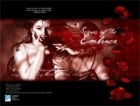 Eventually, as my portfolio grew, I did submit to White Wolf. I come from a literary background, as many of my readers know, so it should come as no surprise I submitted a Promethean: The Created short story for their then-magazine, the White Wolf Quarterly, which was published in…2006 if I’m remembering right. No, that isn’t Vampire, but that came out of my love for the game, because by then the new World of Darkness (which is now known as the Chronicles of Darkness) was the company’s primary focus. Eddy Webb gave me my first assignment, and I was very intimidated following in the footsteps of Will Hindmarch to design and write Scenes of the Embrace for Vampire: The Requiem.
Eventually, as my portfolio grew, I did submit to White Wolf. I come from a literary background, as many of my readers know, so it should come as no surprise I submitted a Promethean: The Created short story for their then-magazine, the White Wolf Quarterly, which was published in…2006 if I’m remembering right. No, that isn’t Vampire, but that came out of my love for the game, because by then the new World of Darkness (which is now known as the Chronicles of Darkness) was the company’s primary focus. Eddy Webb gave me my first assignment, and I was very intimidated following in the footsteps of Will Hindmarch to design and write Scenes of the Embrace for Vampire: The Requiem.
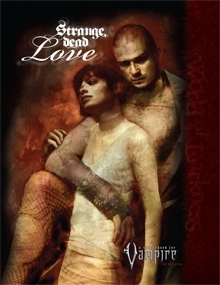 My first draft sucked, and I totally missed the mark. But, thanks to Eddy’s style of collaboration and development, I nailed the second draft. He understood that writing for White Wolf was new for me, but he also knew I was willing to do the work to make it right. It’s partly because of this experience that I give all of my writers the chance to suck on their first drafts, because without that I wouldn’t have been able to keep writing for the company. Then, developer Rose Bailey hired me (along with Jess Hartley and Filamena Hill) to write for Strange, Dead Love which tied neatly into what I learned through the RWA, my feelings on one of the origins of the Western European vampire myth (e.g. the dead, blood-drinking lovers returning from their graves), and the opinions I had on the paranormal romance genre in general.
My first draft sucked, and I totally missed the mark. But, thanks to Eddy’s style of collaboration and development, I nailed the second draft. He understood that writing for White Wolf was new for me, but he also knew I was willing to do the work to make it right. It’s partly because of this experience that I give all of my writers the chance to suck on their first drafts, because without that I wouldn’t have been able to keep writing for the company. Then, developer Rose Bailey hired me (along with Jess Hartley and Filamena Hill) to write for Strange, Dead Love which tied neatly into what I learned through the RWA, my feelings on one of the origins of the Western European vampire myth (e.g. the dead, blood-drinking lovers returning from their graves), and the opinions I had on the paranormal romance genre in general.
Ironically, I was able to write for Vampire: The Masquerade, but that didn’t occur until the (now) Chronicles of Darkness were well established. I wrote one of the Paths of Storytelling as an April Fool’s joke in 2011–a satirical take that was, very specifically, meant to be silly while tapping into canon. Ahem. Then came Vampire: The Masquerade 20th Anniversary Edition later that Fall, a book written and developed by well established designers who had written 1000s of words for White Wolf over the years.
It wasn’t until last year that my first book in the V20 line came out. Developed by Matt (“the Masquerade encyclopedia”) McElroy, we initially planned as a simple update to Kindred Most Wanted. Instead, we turned this supplement into a new way to play Vampire: The Masquerade where fans could play an Alastor and hunt down the Anathema.
This June, Ghouls & Revenants debuted as well, which also offers a nuanced look at the line and an additional way to play the game. This time, instead of playing vampires, a group could play ghouls and revenants and have enough agency to tell a compelling story. Both were done with an eye to provide value to fans, while trying to add something new to Vampire within the confines of the line, since metaplot was not our primary focus.
Now, in 2016, the list of writers has grown to include more voices, more perspectives since those early days. I hope that the landscape will continue to change to be more inclusive, just like David A Hill, Jr. did for V20: Dark Ages to hire more women, to bring better representation to the line. It’s definitely something I thought about when I put together the list of writers for the upcoming V20: Dark Ages anthology, and I feel seeking out new and existing writers have made the collection stronger as a result.
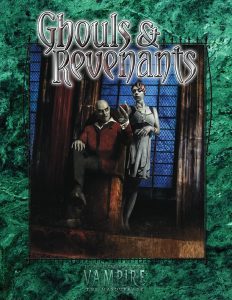 Of course, it’s always a challenge writing for a setting that is, as of this year, 25 years old–not only because a lot of material already exists, but because the fan base is much more diverse than it has been in the past. There are die hard fans, Kickstarter backers, folks who have never heard of Vampire: The Masquerade, and fans who lost touch with the property. As a result, there are several who either don’t remember or understand the cultural impact this particular game had on the vampire genre as a whole, either.
Of course, it’s always a challenge writing for a setting that is, as of this year, 25 years old–not only because a lot of material already exists, but because the fan base is much more diverse than it has been in the past. There are die hard fans, Kickstarter backers, folks who have never heard of Vampire: The Masquerade, and fans who lost touch with the property. As a result, there are several who either don’t remember or understand the cultural impact this particular game had on the vampire genre as a whole, either.
For me, the DNA of Vampire: The Masquerade can be found populated throughout novels and comics, movies and video games, songs and art and TV shows–and this is something that I think should absolutely be recognized. It isn’t always, due to the fact that the internet was not around when this phenomenon happened, but also because games have often had a stigma associated with them. Fortunately, this is beginning to erode the more authors talk about their early influences. I’m of the mind that even if a vampire-loving author isn’t consciously aware of the effects that Vampire: The Masquerade had, it still influences us in other ways because of its significance in the 90s and on so many other works.
So, I mark this anniversary with a sense of pride and gratitude for, not only have I contributed to its storied legacy in the small way that I have, I have also gotten the opportunity to watch and experience Vampire: The Masquerade‘s many iterations as both a fan and a professional. I have no idea what the future holds for the property going forward(2) or how I might intersect with what’s to come, but I am grateful for my experiences. I hope that the combination of the old and the new, the past and the present, will inspire Vampire fans for years to come. To me, that’s what matters the most.
Happy 25th Anniversary Vampire: The Masquerade!
(1) I know and have worked with Justin et al, so this is not meant to be a slam on them at all. This is more in the context of identity as opposed to anything else.
(2) Even if I did know, I couldn’t say anything more out of professional obligation.




July 25, 2016
Announcing Drawing Destiny: A Sixth World Tarot Anthology
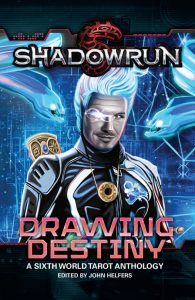
I am pleased to announce today that I will have a story titled “My Enemy, Mi Amici” in an upcoming Shadowrun anthology from Catalyst Game Labs. The collection, which is edited by John Helfers, is inspired by the Sixth World Tarot. I chose the Higher Power card as my theme, and you can find a preview of the art below.
If you want to learn more about the anthology that’ll be released in August, you can read my design notes on Tumblr or follow along here on my website. I’ll announce when the anthology will be released following Gen Con. Huzzah!





July 22, 2016
[New Release] Court of Shadows for Shadowrun 5th Edition
Today, I am pleased to announce that Court of Shadows, a brand new setting for Shadowrun 5th Edition, is now available in PDF. The print edition will be out in August, and there’s a possibility Catalyst Game Labs will have this supplement for the show. I co-designed the setting with Jason Hardy for this supplement, and contributed a huge chunk of the writing, too. I hope you enjoy this new and mysterious look into the realm of the fae!
The Falling Dream
You have seen it. You have felt it. The dream where you are falling, falling, and you cannot see the ground but you know it is there waiting. You may try to brace yourself, you may try to force yourself awake—you do anything to avoid the impact that keeps rushing toward you.
The Seelie Court is the realm of the hidden, the rumored, and the unknown. Fairies, spirits, and enchanted creatures mingle there, building alliances, plotting, scheming, toying with the realm of humans—and with each other. The Court has long held a distant attachment to the material plane, influencing it like a dream influences our waking hours. But now a new connection has emerged, allowing humans to infiltrate the courts and influence its proceedings. At a time when magical power is ever in the rise, the mix of human and fae could set both worlds into a calamitous plunge, and no one will want to be awake when they hit bottom.
Court of Shadows is an alternate setting for Shadowrun 5th Edition, emphasizing the magic and intrigue of the Seelie Court. With full setting, character, and plot details, as well as information on using SR5 characters in the Seelie Court, this book presents all-new ways to play Shadowrun and to live in the mystical intrigue of the planes of fairy, capturing the magic of the dream world—and seeing if they can prevent its fall.
Court of Shadows is for use with Shadowrun 5th Edition.




July 15, 2016
My Interview with Dragon+ Magazine
The fine folks over at Dragon+ Magazine have interviewed me for a new segment titled “The Best of the Dungeon Master’s Guild.” In my interview, I discuss my thoughts on dmsguild.com, Battle for the Undercity, and my other upcoming new releases in the gaming industry.
Thanks to John Houlihan and all the fine folks at Wizards of the Coast for their continued support of my work. Hope you enjoy the interview!




July 14, 2016
Progress Report #10: On Writing Like the Wind
I just realized that my last progress report was from December of last year. Whoops! Rectifying this today, so I can keep you apprised of any new announcements coming up.
In Project #9, I talked a lot about the importance of doing research when writing historical era research, and how if you are writing about the past it’s quite possible you’re going to get things wrong. As an addendum to that, I think it’s important to remember that even though writers are very, very smart, because we know how to research and look things up and talk to people, that doesn’t necessarily mean our intentions or our work will be interpreted the same by every reader in a cultural, intellectual, or emotional fashion. This is pretty exciting, in my mind, because it means we can have conversations we couldn’t before and learn from them–provided we’re able and willing to listen. Sometimes, however, that’s a bit of a challenge as there might be constraints as to what the next steps might be, or parameters (especially on bigger named properties like Star Wars or what have you) that writers are bound by. Regardless, I see this as an opportunity rather than a challenge, and though I cannot be perfect (nor do I want to be), I feel this spells nothing but good news for the relationship between writers and readers.
I should also point out that a lot of work listed below is past tense; I’m always open to discussing new opportunities. Thanks! On to my tips for writing like the wind!
To Write Fast, Write Smart
A couple of weeks ago, I wrote 10,500 words in one day, and I “think” my fastest slog was 25,000 in two days back in college. I have written 12 or 13,000 in a day, too, but I’d much rather write 3 to 5k at a steady speed than lose my humanity, hurt my writers, and/or fall into the black hole that is my brain. However, there are some reasons to write fast like…procrastination, zombie projects (e.g. manuscripts you thought died but came back to life and need to be shot in the head. again.), shifting deadlines, life crap (being sick), etc.
Retention-wise, when I write fast I average between 90-95%, and ironically I retain more when I’m sprinting than when I’m not. A couple things to remember, though: I started writing when I was very young and focused on literary fiction through college, so I’m not new to this writing thing. Do I get neurotic or forget to exercise my story brain muscles if I’m too focused on one thing or the other? Ab-so-frigging-lutely. Writing is not a static thing for me, and it never has been. However, I feel that my experiences are important to mention, because sometimes I find folks put a lot of pressure on themselves to soak up all the writing advice they can to poop out great stories and write fast or write perfect when in all actuality? The only solution to figuring out what works and what doesn’t is to keep writing. It’s really the only way to internalize processes that are external to start–and yes, those processes can be forgotten or buried depending upon what your focus is. Something along the lines of… If you want to write novels, then write novels. Don’t write short stories or games and expect to know how to write a novel. Or, more to the point, my favorite acronym ever (K.I.S.S.) is sometimes the best way to proceed. If a thing doesn’t have to be complicated, why make it so?
Anyhoo… In order to write fast, I feel it’s important to take into account what you/I know about your/myself as a writer. I think that some of the self-analytical bits are hugely important, because if you don’t know what your process is or how fast you write in different areas, then it’s really hard to plan word count as a metric. I should point out that I do map a lot of my goals to word count for Day JobTM sorts of things, but haven’t done that for the spec stuff in a while, even though I’m starting to do that now.
Some examples of things I know about my writing speed are:
If I have to worldbuild during or after a project, I write slower.
I hate wasting time on a draft, only to throw it away.
I worry that my bad habit of using filler words (e.g. that) in a draft will make the story uninteresting.
Research is my kryptonite, because I love to do it.
Writing cold is the hardest thing for me to do.
I know that I can write, consistently, somewhere between 3k to 5K per day if I’m writing full-time.
Writing a variety of characters/scenes/etc. is slower going than a chapter on “a” topic.
Writing a chapter on a single topic bores me to tears.
I need to hear the character’s voice in my head before I write them.
I write fastest/best when uninterrupted for short periods of time.
So, my solutions to this knowledge help speed up my writing. I think of these things as prep work, and they might include:
Elevator pitch – If I don’t know what the story is about, then that is wasted effort. Yes, sometimes I need to write to find the character’s voice, but that’s a different and intentional exercise to solve a separate problem. Even if I don’t have an outline, at bare minimum an elevator pitch or short synopsis will keep the story contained.
Word sprints – For this, all I need is a timer and an hour of uninterruptions. Then, I write as fast as I can for that hour, after my prep work is done. I’ve written (at most) 1,300 words this way.
Milestones – I use milestone planning when working on larger projects, to set smaller goals. This really helps because if a deadline shifts, I can use word sprints after doing massive amounts of planning (e.g. research, character/dialog sketches/word lists) to get the project done.
Write to the beginning – This tip came from John Hornor Jacobs, but it’s a really good one. Instead of writing to the end of a scene, write the first couple of sentences in the next section to mentally prepare yourself for a head start.
Revision checklists and filler words – I plan to be wrong or to have errors in my work, and this reduces my anxiety about writing drafts as well. I know I use filler words, so sometimes I have word lists, character names/place names, etc. Sometimes I’ll put words in brackets or use a highlighter; I almost ALWAYS read my work out loud and change the font/spacing, to give me a different perspective on my work.
For me the key to writing fast is to do prep work both before and after, knowing that the in between bit (the actual writing) is the middle of my process–and not the end. Freaking out about the end is what significantly kills my ability to write, so I remove that anxiety by shifting the work and emotional weight to a multi-step process. This both occupies my mind and helps me the more I write a specific kind of project; this is partly why doing anything “new” can freak me out more, so I tend to overcompensate by planning more up front work.
Often, I have to remind myself that I cannot revise a blank page, and I cannot sell the story that hasn’t been written yet. Sometimes, to push through that, writing fast is the only way to get over that anxiety, because then I have a draft to edit and revise–which is more than I had to begin with.
Hope this helps you find your own process. On to the updates!
Games
I’ve got some new updates for you on the games front. Huzzah!
World of Darkness: Dark Eras – Wrote the Hunter: the Vigil supplement for this book for 1690s Colonial America. This is now available for fans to purchase.
Vampire: The Masquerade: Ghouls & Revenants – Contributed and edited this book. This is now available for fans to purchase.
Robert E. Howard’s Conan RPG – This hasn’t been released yet, but my understanding is that it will be shortly.
Codex Infernus – The Kickstarter was successful, and it’s now available for fans to purchase.
World of Darkness: Dark Eras II – Contributed to the Geist: the Sin-Eaters supplement for the 1580s-90s Roanoke Colony. This hasn’t been released yet, but it will likely be available this Fall.
Hunter: The Vigil 2nd Edition – I’m the developer for this, and I’m working on the outline and putting together my team of writers. The submission guidelines are available here.
Court of Shadows – I designed a new setting for Shadowrun with Jason Hardy, and contributed several thousand words to this unique supplement. The book will be out this Fall.
Fiction
Upside Down: Inverted Tropes in Storytelling – We raised ~24,000 on the Kickstarter and had close to 1,400 backers. We were able to bump the pay rate for our storytellers and add two essayists. The collection is in proofing right now, and I’m working with Jason on delivery and timing.
Red Byte – Revisions put on hold.
Pratchett on Acid – 25K into the new novel, and it is…creative? Inventive? Heh, heh. Though, I’m going to flip this into a novella, because I think the story will be stronger in that format. I’m having TOO MUCH FUN with worldbuilding.
Vampire: The Masquerade Dark Ages Anthology – I’m editing a collection of stories for this setting, and we are now in second draft stage.
TBA times three – Wrote three media/tie-in short stories for [redacted], [redacted], and [redacted]. Two of those collections will be debuting this Fall.
Comics
Ugh. Ugh. Ugh.
Anthos – Two rejections.
Sparkle Mega – Full pitch is still in the works for a short-term series. The pitch window hasn’t re-opened yet, so this got put on hold. Found out the publisher doesn’t pay, though so am confirming this before moving forward.
Red Sigma – In addition to pitching, I am going the small press publishing route for a collection. Still in planning stage.
Non-Fiction
Super yay!
Worldbuilding Book – Pitches are being sent out. Yay!
The Gorramn Shiniest Dictionary in the ‘Verse – This language guide for the Firefly TV show is now available AND it has an entire section for the Chinese (Cantonese and Mandarin) AND an interview with the fabulously talented Jenny Lynn!.
Thus endeth the latest update!




booksofm.com
- Monica Valentinelli's profile
- 34 followers


